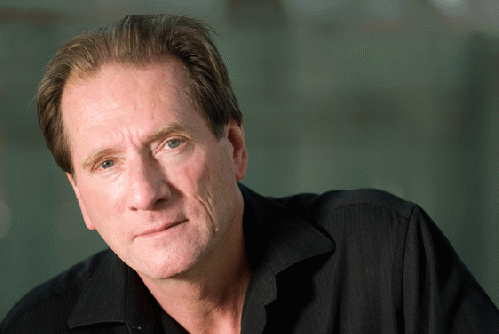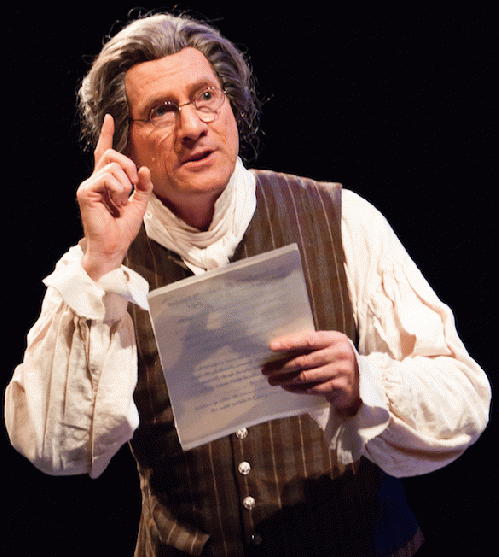| Back OpEd News | |||||||
|
Original Content at https://www.opednews.com/articles/How-Thomas-Paine-Still-Fig-by-Meryl-Ann-Butler-Democracy_Freedom_Independence_Revolution-141201-305.html (Note: You can view every article as one long page if you sign up as an Advocate Member, or higher). |
|||||||
December 1, 2014
How Thomas Paine Still Fights for the Soul of America
By Meryl Ann Butler
Ian Ruskin is an actor, playwright, and producer on a mission (in the words of Thomas Paine) "to begin the world over again." In his stunning performances, Ruskin shows us that Paine's ideas speak to a long & vital list of current issues. If he were alive today, this Founding Father would be in the front lines of the Occupy Movement. And through Ruskin, Paine's words continue to inspire from beyond the grave.
::::::::
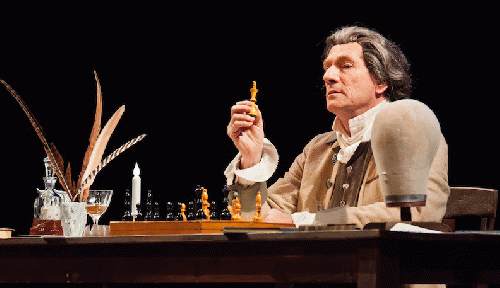
Ian Ruskin as Thomas Paine in To Begin the World Over Again: The Life of Thomas Paine
(Image by Tom Dempsey, copyrighted, used with permission) Details DMCA
Ian Ruskin is an actor, playwright, and producer on a mission to--in the words of Thomas Paine--"begin the world over again."
You may have seen Ruskin guest starring on such shows as "Murder She Wrote", "Scarecrow and Mrs. King" and "MacGyver", or you may have heard his voice work in over 100 films and television shows.
In 2010 he received a COLA (City of Los Angeles) Fellowship to write "To Begin the World Over Again: the Life of Thomas Paine," a one-man play which Ruskin is now performing across America, and developing into a television movie for distribution to PBS. Like Paine, Ruskin was born in England and came to America in his mid-30's.
The author of the iconic "Common Sense," Thomas Paine's famous words fueled the American Revolution. On Dec. 17, 1776, George Washington wrote to his brother:
Your imagination can scarce extend to a situation more distressing than mine. I think the game is pretty near up.
Yet Washington had a plan for a surprise attack, a risky one, perhaps his last hope. As his shoeless, shivering soldiers climbed into boats, about to embark on the seemingly insane crossing of the Delaware River in a snowstorm, he had his officers read Paine's "The American Crisis: December 23, 1776" to his cold and weary men. They were inspired:
THESE are the times that try men's souls. The summer soldier and the sunshine patriot will, in this crisis, shrink from the service of their country; but he that stands by it now, deserves the love and thanks of man and woman. Tyranny, like hell, is not easily conquered; yet we have this consolation with us, that the harder the conflict, the more glorious the triumph.
Paine was praised by Washington, Thomas Jefferson and James Madison, mentored by Ben Franklin, and condemned by John Adams. He went from poverty to world acclaim and back again, was celebrated as a hero, and jailed as a traitor. At various times he worked as a tax collector, corset-maker and briefly as a politician. Only an unexpected miracle saved him from the French guillotine. His books outsold everything but the Bible, yet when he died, only a half dozen mourners showed up to his funeral--and later his bones were dug up, and inexplicably lost.
In "To Begin the World Over Again: the Life of Thomas Paine," Ruskin's extraordinary performance brings Paine back to life. It may not be necessary to find Paine's bones, for Ruskin has found his soul.
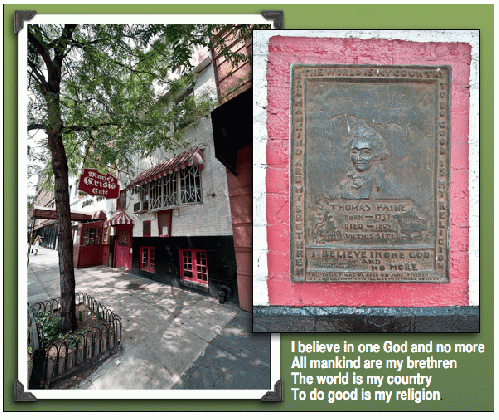
Payne's Death House Marker. Inscription: Thomas Paine, Born 1737, Died 1809 On this site. (59 Grove S, Greenwich Village, NYC)
(Image by R. C. (of Shrewsbury, New Jersey), Historical Marker Database) Details DMCA
Meryl Ann Butler: Thanks for taking time to visit with us here at OpEdNews, Ian! Your performance, which I heard on CD, is stunning and deeply inspiring. You have projected Paine's voice across two centuries, and his message seems as pertinent today as it was then. Can you share a few of Paine's thoughts that speak to today's political situation in the US?
Ian Ruskin: Yes, it is extraordinary that words written over 200 years ago still resonate as they do, and that is why I wrote this play. If America had listened to Thomas Paine then, we would be living in a very different country today, a country without the stain of slavery and the toll of endless wars, and with a government dedicated to the happiness of ALL of its citizens.
That's why I perform the play, in the hope that it's not too late!
And by the way, if Paine were here today, he'd be 16 hours a day on the internet, blogging and "wiki-leaking" everything he could get his hands on. He was, after all, the first "leaker" (in "The Silas Deane Affair") long before Julian Assange and Edward Snowden.
Paine would also be demanding the right of citizens to peer into the heart of their governments even though governments often wish to hide what heart they have.
MAB: I think you are quite generous in assuming there is a heart in our government at all! I know Paine was a strong advocate of the right to vote--what would he want to tell us on that subject?
IR: In his "Rights of Man, Part One," (1791) he says:
All individuals are born with equal natural rights -- men, women, white, black, rich, poor, young, old.
Absolutely revolutionary!
There was a famous case, in the early years of this "Republic", of a man fell who on hard times and had to sell his ass, thereby losing enough of his assets as to also lose his right to vote. Benjamin Franklin posed the question "wherein lies the vote, in the man or in the ass?"
Paine said that all men should vote, and that women had the same rights as men--and he would be appalled that there are still attempts to suppress the right to vote, and that the number of votes cast often does not reflect who wins, due to gerrymandering, voting machine "anomalies" casting votes for another candidate, machines without back-up copies of votes cast and, of course, the ultimate high-tech challenge of hanging chads.
Paine would be amazed that Americans landed men on the moon 45 years ago but still can't count votes accurately and worse still, don't seem to care. Paine saw the vote as a fundamental RIGHT for all, not a privilege for a few. This debate began before the Revolution and if America is to ever become a true Republic it must be settled or at some point the Republic will fall. Perhaps Paine would be 18 hours a day on the Internet.
MAB: Thanks, Ian, and what about Paine's views on the role of government?
IR: Paine had a lot to say about government, as did his fellow Founding Fathers:
Governments must be formed through the explicit consent of the people. Governments have no rights, only duty to their citizens. --Thomas Paine, Rights of Man, Part One, 1791Paine today would be in the front lines of the Occupy Movement, demanding that government's only duty was to serve the interests of ALL the people.
On the other hand, John Adams wrote that the United States should be governed "by a few of the most wise and good, the rich, the wellborn and the able."
Alexander Hamilton said "the rich and wellborn should have a distinct, permanent share in the government--to check the imprudence of democracy." Today we have a rich and wellborn one percent that, through their corporations, check the imprudence of democracy by pouring vast sums of money into politicians' campaigns, and they are NOT doing it out of the goodness of their hearts, but for the legislation their politicians will pass on their behalf.
I suspect that today, Paine would say, "a 40-year politician is a politician 36 years too long." He believed--and here we go off a cliff for much of the Washington DC establishment--that those elected were actually elected to serve the people who elected them, that they must never develop interests different to those who elected them, and that they should serve SHORT times as the elected, lest they forget the needs of those who elected them.
If all politicians only served--and the word is served--for 4 years rather than 40, we would be years closer to Universal Health Care and we would have a strong and secure Social Security system and so many of the social services that countries all over the world have, and that all our career politicians have, but that so many Americans do not have.
OK, Paine would be 20 hours a day on the Internet.
So, yes, his words and ideas speak to a long and vital list of issues today. And I have seen his words illuminate audiences and his life, with all its challenges and setbacks and dangers, inspire people to stand up for a better world. How amazing is that!
MAB: It is amazing! And your performances bring him to life in a time that needs him, and needs his ideas. And that is what I see as the highest role of art: to inspire those who experience it, toward becoming the best they can be.
In my observation, art is a more powerful force to change society than politics, because it speaks primarily to the heart and soul, and once the heart and soul are moved, a person can't help but be inspired to greater things.
And it is imperative to evolve toward greater things in the area of racial equality. I'm a hippie child of the 60's, and back then I was involved in civil rights activism. And long before that, my great-great-great-grandfather died at Gettysburg. So I am horrified at the barbarian backsliding we are currently seeing in racial situations, notably with the recent and appalling deaths of Mike Brown, Trayvon Martin and Eric Garner (who died last July from a police-inflicted chokehold after he was arrested for illegally selling cigarettes.) Just last week we saw a videotape released of a Kentucky Fire Chief, Julius Hatfield, offering help to the white person in a two-car accident, while refusing help to the Black family in the other car, as he laughs, saying ""We ain't taking no n------ here."
I know that Paine abhorred slavery. What would he have to say about this?
IR: To the Kentucky Fire Chief, Paine would say
The greatest offence of all to the great Father is when we seek to torment and render each other miserable.Regardless of skin color.
And to all Americans, since the first smell of revolution until today, Paine would again say,
I reflect that since the discovery of America she, Britain, hath employed herself in the most horrid of all traffics, that of human flesh.He demanded immediate emancipation of all Africans in the colonies, which didn't, of course, happen. Or as someone would come to say "What would have happened when Patrick Henry said "Give me liberty or give me death" if one of his slaves had stood up and said "Me, too!"
But just think of what a different country we would be: no Civil War needed, no emancipation movement needed, no endless hounding of our President.
As to war, Paine sparked the American Revolution, but was very wary of war, seeing it as a never-ending device by which Monarchical Governments then--and Corporate Governments now--create wealth for themselves. Yes, war is the common harvest of all those who participate in the division and expenditure of public money, in all countries. It is the art of conquering at home.
After months of research, and with a growing sense of the man in me, I looked around and saw statues and miniseries and school textbooks full of Washington, Franklin and Jefferson, but hardly a trace of Paine. I knew then that I had to write the play. And when I began to see the absurd misunderstandings and distortions of his ideas and vision, I knew that I had to take the story to as many people as possible.
MAB: I'm so glad you did! Experiencing history in this way is one of the ways we evolve--both individually and as a nation--the arts always seem to be the midwives of this evolutionary process. It is easy to see how your poignant portrayal of Paine inspires so many to greater good. And thanks for sharing how Paine's story personally inspired you--story connects us to the deeper levels of meaning behind the facts, and the storyteller's essential job is to weave the fabric that supports the community.
I understand that right now you are fundraising to develop this project into a television movie for distribution to PBS, that's exciting! Can you tell us more?
IR: Yes, we have an Indiegogo Campaign that continues through Wed., Dec. 10th, 2014, and we're very excited about it. It's a democratic campaign, you can give anything from $1 and on up. Paine would like that.
We will follow in the footsteps of our film of my first one-man play, "From Wharf Rats to Lords of the Docks" about radical labor leader Harry Bridges (which aired on PBS for 4 years.) NETA distributed that film and they are eagerly awaiting this one! We set a target of $25,000 and about halfway through the campaign we have already raised $18,000. Exceeding the target will bring us even closer to filming, since we've already raised $35,000 of the $100,000 budget from other sources.
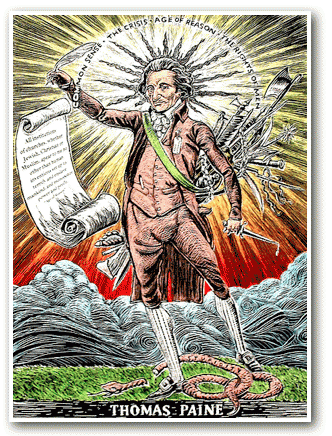
This limited edition screen print of Paine is one of the perks of the Indiego-go campaign
(Image by Jos Sances/Alliance Graphics, after Cruikshank) Details DMCA
This is a nonprofit project, so donations are tax-deductable and there are great thank you gifts. So yes, I'm happy to invite readers to please join us, let's take this man's extraordinary story to 150 million Americans and, who knows, to the BBC and the Canadian Broadcasting Corporation and France Televisions.
MAB: Thanks so much, Ian, for sharing both Paine's and your visions to truly "Begin the World Over Again", and perhaps save the soul of America. I'm newly hopeful and inspired!
IR: Thanks so much for your support! Ian Ruskin's website: www.thelifeofthomaspaine.org
Ian Ruskin's Facebook page: www.facebook.com/ianruskin?fref=ts
See the YouTube video about "From Wharf Rats to Lords of the Docks" at https://www.youtube.com/user/harrybridgesproject?feature=results_main
Of interest:
The Social Security Administration offers the complete text of Thomas Paine's "Agrarian Justice" on their web site.
The Thomas Paine Society website.
The Thomas Paine National Historical Association website.
Authors Website: http://www.OceanViewArts.com
Authors Bio:
Meryl Ann Butler is an artist, author, educator and OpedNews Managing Editor who has been actively engaged in utilizing the arts as stepping-stones toward joy-filled wellbeing since she was a hippie. She began writing for OpEdNews in Feb, 2004. She became a Senior Editor in August 2012 and Managing Editor in January, 2013. In June, 2015, the combined views on her articles, diaries and quick link contributions topped one million. She was particularly happy that her article about Bree Newsome removing the Confederate flag was the one that put her past the million mark.
Her art in a wide variety of media can be seen on her YouTube video, "Visionary Artist Meryl Ann Butler on Creativity and Joy" at http://www.youtube.com/watch?v=UcGs2r_66QE
A NYC native, her response to 9-11 was to pen an invitation to healing through creativity, entitled, "90-Minute Quilts: 15+ Projects You Can Stitch in an Afternoon" (Krause 2006), which is a bestseller in the craft field. The sequel, MORE 90-Minute Quilts: 20+ Quick and Easy Projects With Triangles and Squares was released in April, 2011. Her popular video, How to Stitch a Quilt in 90 Minutes with Meryl Ann Butler can be seen at http://www.youtube.com/watch?v=PrShGOQaJQ8
She has been active in a number of international, arts-related projects as a citizen diplomat, and was arts advisor to Baltimore's CIUSSR (Center for Improving US-Soviet Relations), 1987-89. She made two trips to the former USSR in 1987 and 1988 to speak to artists, craftpeople and fashion designers on the topic of utilizing the arts as a tool for global wellbeing. She created the historical "First US-Soviet Children's Peace Quilt Exchange Project" in 1987-88, which was the first time a reciprocal quilt was given to the US from the former USSR.
Her artwork is in collections across the globe.
Meryl Ann is a founding member of The Labyrinth Society and has been building labyrinths since 1992. She publishes an annual article about the topic on OpEdNews on World Labyrinth Day, the first Saturday in May.
OpEdNews Senior Editor Joan Brunwasser interviewed Meryl Ann in "Beyond Surviving: How to Thrive in Challenging Times" at https://www.opednews.com/articles/Beyond-Surviving--How-to-by-Joan-Brunwasser-Anxiety_Appreciation_Coronavirus_Creativity-200318-988.html
Find out more about Meryl Ann's artistic life in "OEN Managing Ed, Meryl Ann Butler, Featured on the Other Side of the Byline" at https://www.opednews.com/Quicklink/OEN-Managing-Ed-Meryl-Ann-in-Life_Arts-Artistic_Artists_Quilt-170917-615.html
On Feb 11, 2017, Senior Editor Joan Brunwasser interviewed Meryl Ann in Pink Power: Sister March, Norfolk, VA at http://www.opednews.com/articles/Pink-Power-Sister-March--by-Joan-Brunwasser-Pussy-Hats-170212-681.html
"Creativity and Healing: The Work of Meryl Ann Butler" by Burl Hall is at
http://www.opednews.com/articles/Creativity-and-Healing--T-by-Burl-Hall-130414-18.html
Burl and Merry Hall interviewed Meryl Ann on their BlogTalk radio show, "Envision This," at http://www.blogtalkradio.com/envision-this/2013/04/11/meryl-ann-butler-art-as-a-medicine-for-the-soul
Archived articles www.opednews.com/author/author1820.html
Older archived articles, from before May 2005 are here.
